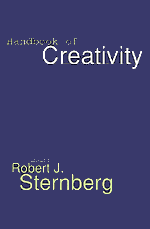Book contents
- Frontmatter
- Contents
- List of Contributors
- Preface
- Handbook of Creativity
- PART I INTRODUCTION
- PART II METHODS FOR STUDYING CREATIVITY
- PART III ORIGINS OF CREATIVITY
- 7 Biological Bases of Creativity
- 8 Evolving Creative Minds: Stories and Mechanisms
- 9 The Development of Creativity
- PART IV CREATIVITY, THE SELF, AND THE ENVIRONMENT
- PART V SPECIAL TOPICS IN CREATIVITY
- PART VI CONCLUSION
- Author Index
- Subject Index
8 - Evolving Creative Minds: Stories and Mechanisms
Published online by Cambridge University Press: 05 June 2014
- Frontmatter
- Contents
- List of Contributors
- Preface
- Handbook of Creativity
- PART I INTRODUCTION
- PART II METHODS FOR STUDYING CREATIVITY
- PART III ORIGINS OF CREATIVITY
- 7 Biological Bases of Creativity
- 8 Evolving Creative Minds: Stories and Mechanisms
- 9 The Development of Creativity
- PART IV CREATIVITY, THE SELF, AND THE ENVIRONMENT
- PART V SPECIAL TOPICS IN CREATIVITY
- PART VI CONCLUSION
- Author Index
- Subject Index
Summary
Does a passion to create drive the human species, making us utterly different from all other living things with which we share the planet? Or do our capacities for novelty, great and small, link smoothly to those in other species, so that human creativity is really a variant on a theme repeated countless times in the history of life? Are we to understand ourselves as expressing a “regional dialect” for innovation - unique and special in its own way to be sure, but nonetheless a restyling of universal evolutionary stratagems?
Stressing descent with modification, Darwinism seems to say that we are both special and mundane. Is this a fact of human evolution or a fact of evolution's inability to explain humanity? Just partially humbled by our place in the Earth's teeming pattern of life Darwinians reach, Prometheus-like, past psychology and even past philosophy to explain our behaviors, minds, and social forms in a language once reserved for debates about hybrid corn or fungus growing among ants. What is going on?
Blame it on the cognitive revolution. In the breezy days of behaviorist populism, evolution, following Darwin's lead, was content largely with speculations about the origins of instinct and drives. This was the thin end of the wedge that evolutionists have driven into the mind as behaviorism has thawed into cognitive science and the mysteries of consciousness, intention, self-awareness, and human genius returned from the fringes of scientific respectability to crowd the center of human science.
- Type
- Chapter
- Information
- Handbook of Creativity , pp. 153 - 168Publisher: Cambridge University PressPrint publication year: 1998
- 6
- Cited by



